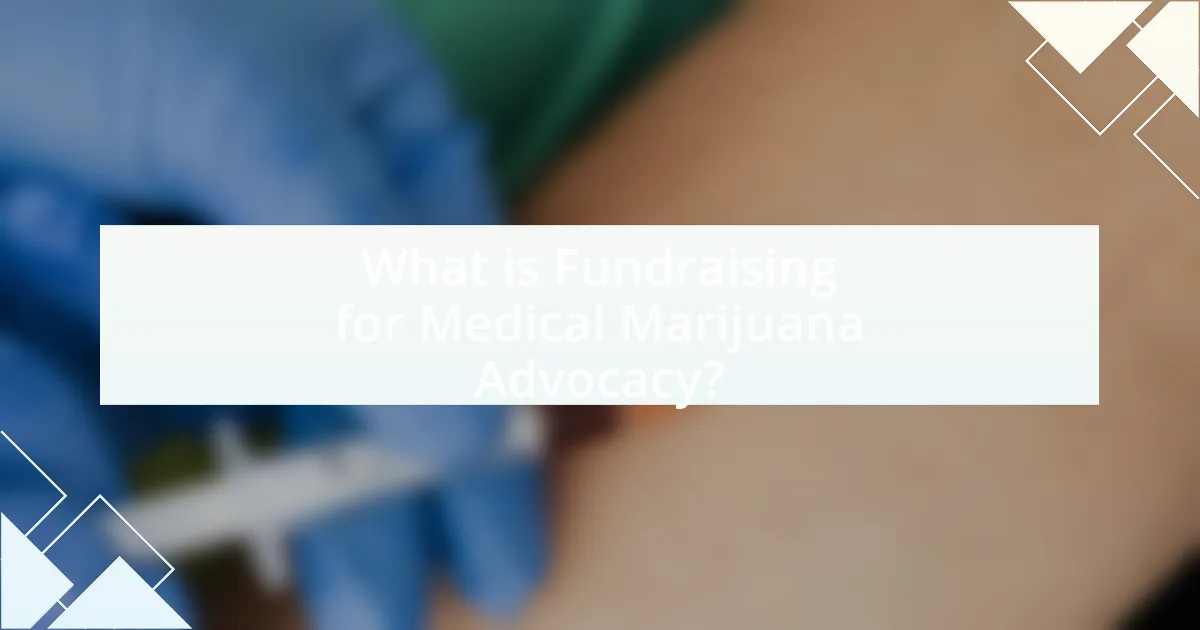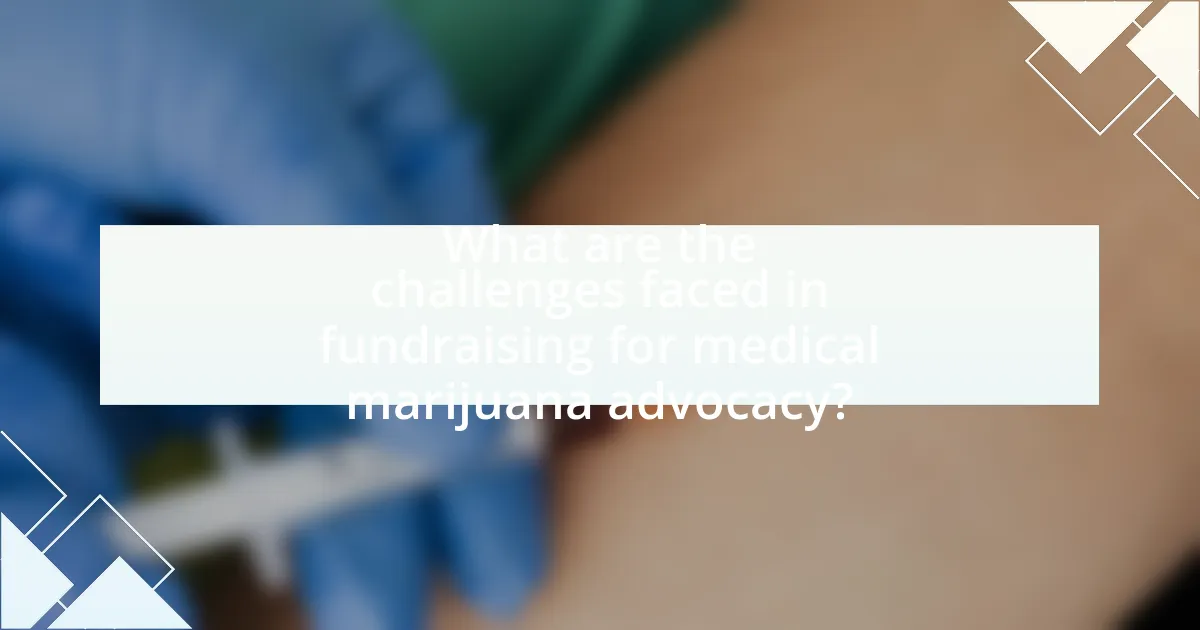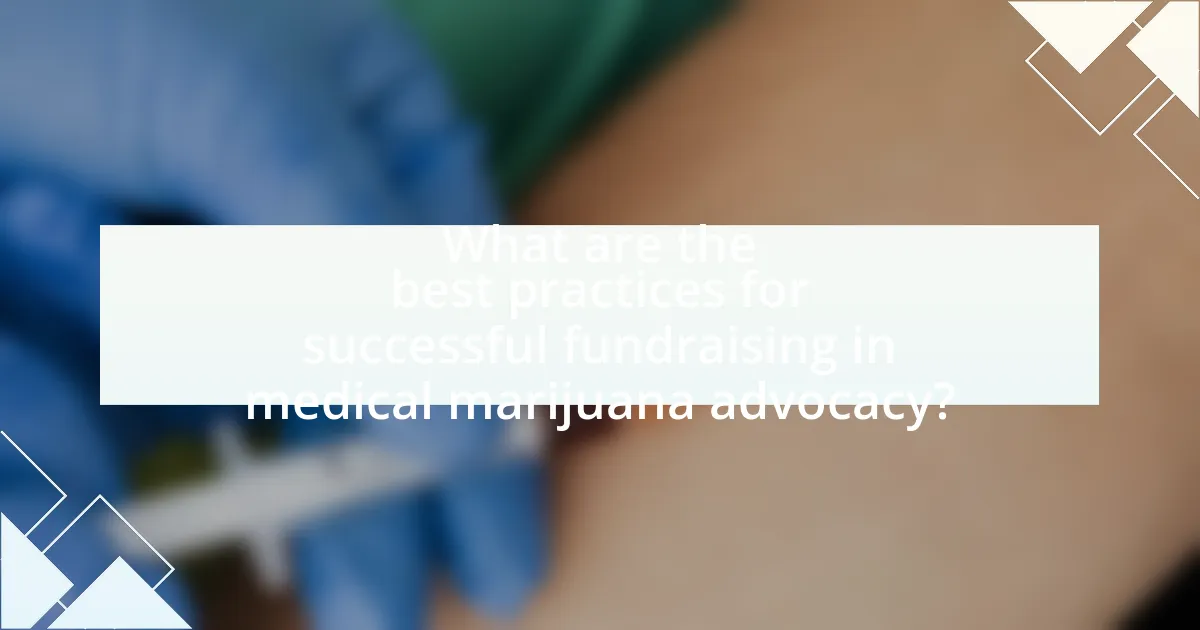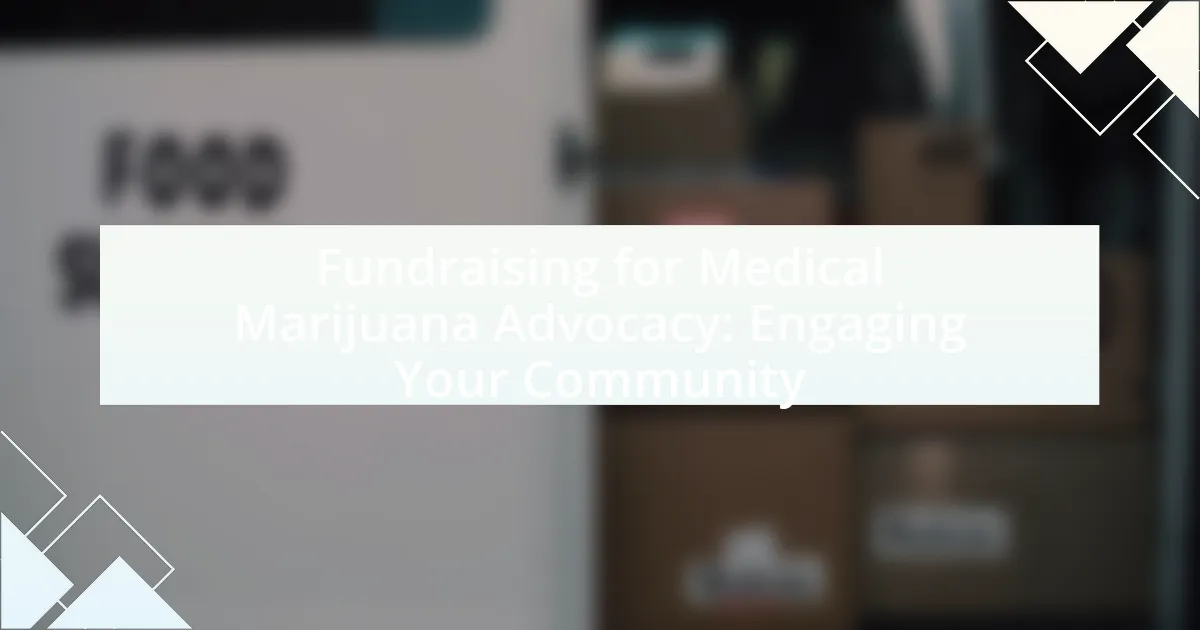Fundraising for medical marijuana advocacy is a critical process aimed at promoting the legalization and acceptance of medical marijuana through financial support for educational campaigns, legal efforts, and community outreach. This article outlines the importance of fundraising in advancing research, influencing policy changes, and mobilizing community engagement. It discusses various fundraising methods, including crowdfunding and events, and highlights the roles of key stakeholders such as patients, healthcare professionals, and advocacy organizations. Additionally, the article addresses challenges faced in fundraising, including legal restrictions and stigma, while providing best practices for successful campaigns that leverage storytelling and social media to enhance community involvement and support.

What is Fundraising for Medical Marijuana Advocacy?
Fundraising for medical marijuana advocacy involves raising financial support to promote the legalization and acceptance of medical marijuana. This type of fundraising typically aims to support educational campaigns, legal efforts, and community outreach initiatives that highlight the benefits of medical marijuana for patients with various health conditions. For instance, organizations like the National Organization for the Reform of Marijuana Laws (NORML) have successfully raised funds to advocate for policy changes and public awareness, demonstrating the effectiveness of targeted fundraising efforts in influencing legislation and public opinion.
Why is fundraising important for medical marijuana advocacy?
Fundraising is crucial for medical marijuana advocacy because it provides the financial resources necessary to support research, education, and legislative efforts. These funds enable advocacy groups to conduct studies that demonstrate the medical benefits of marijuana, which can influence public opinion and policy decisions. For instance, a report from the National Academies of Sciences, Engineering, and Medicine in 2017 highlighted that substantial funding is needed to explore the therapeutic potential of cannabis, underscoring the importance of financial contributions in advancing the cause. Additionally, fundraising allows organizations to mobilize community engagement, organize events, and create awareness campaigns that are essential for driving change in legislation and public perception.
What are the key goals of medical marijuana advocacy fundraising?
The key goals of medical marijuana advocacy fundraising are to promote awareness, support research, and influence policy changes regarding medical cannabis. Advocacy fundraising aims to educate the public about the benefits of medical marijuana, thereby increasing acceptance and understanding. Additionally, funds raised are often allocated to support scientific studies that validate the efficacy of medical marijuana for various health conditions, which is crucial for gaining regulatory approval. Furthermore, these fundraising efforts seek to mobilize resources for lobbying activities that aim to reform laws and regulations surrounding medical marijuana use, ensuring that patients have access to necessary treatments.
How does fundraising support the medical marijuana movement?
Fundraising supports the medical marijuana movement by providing essential financial resources for advocacy, research, and education efforts. These funds enable organizations to lobby for legislative changes, conduct studies on the efficacy of medical marijuana, and raise public awareness about its benefits. For instance, in 2020, the National Organization for the Reform of Marijuana Laws (NORML) reported that fundraising efforts helped finance campaigns that led to the legalization of medical marijuana in several states, demonstrating the direct impact of financial contributions on policy change.
What are the common methods of fundraising for medical marijuana advocacy?
Common methods of fundraising for medical marijuana advocacy include crowdfunding, hosting events, and seeking donations from individuals and organizations. Crowdfunding platforms allow advocates to reach a wide audience and gather small contributions from many supporters, which can accumulate to significant amounts. Hosting events such as benefit concerts, educational seminars, or community fairs not only raises funds but also raises awareness about medical marijuana issues. Additionally, soliciting donations from individuals who support the cause or from organizations aligned with medical marijuana advocacy can provide substantial financial support. These methods have been effectively utilized in various campaigns, demonstrating their viability in generating necessary funds for advocacy efforts.
How do crowdfunding platforms work for medical marijuana initiatives?
Crowdfunding platforms facilitate fundraising for medical marijuana initiatives by allowing individuals or organizations to present their projects and solicit financial contributions from the public. These platforms typically operate by enabling project creators to set a funding goal and a deadline, while supporters can contribute any amount, often in exchange for rewards or incentives related to the initiative. For example, platforms like GoFundMe and Kickstarter have been used to raise funds for medical marijuana research, advocacy, and patient support, demonstrating their effectiveness in mobilizing community support. In 2020, a study indicated that crowdfunding campaigns for medical marijuana initiatives raised over $10 million collectively, highlighting the growing acceptance and financial backing for such projects.
What role do events play in fundraising for medical marijuana advocacy?
Events play a crucial role in fundraising for medical marijuana advocacy by providing a platform for community engagement and awareness. These gatherings, such as benefit concerts, educational seminars, and community festivals, not only raise funds but also foster connections among advocates, patients, and supporters. For instance, a study by the National Organization for the Reform of Marijuana Laws (NORML) highlights that events can significantly increase public support and donations, with some events raising thousands of dollars in a single day. This demonstrates that well-organized events can effectively mobilize resources and amplify the advocacy message, making them essential for the financial sustainability of medical marijuana initiatives.
Who are the key stakeholders in medical marijuana advocacy fundraising?
The key stakeholders in medical marijuana advocacy fundraising include patients, healthcare professionals, advocacy organizations, policymakers, and investors. Patients are crucial as they represent the primary beneficiaries of medical marijuana, often sharing personal stories that drive fundraising efforts. Healthcare professionals lend credibility and expertise, advocating for the medical benefits of marijuana. Advocacy organizations mobilize community support and resources, often leading fundraising campaigns. Policymakers influence legislation and funding opportunities, making their support vital for advocacy success. Investors provide financial backing, recognizing the potential market for medical marijuana. Together, these stakeholders create a comprehensive network that supports and advances medical marijuana initiatives.
What roles do advocates, patients, and organizations play in fundraising?
Advocates, patients, and organizations each play crucial roles in fundraising for medical marijuana advocacy. Advocates mobilize community support, raise awareness, and influence policy, which can lead to increased donations and participation in fundraising events. Patients share personal stories that humanize the cause, fostering empathy and encouraging others to contribute financially. Organizations provide structure and resources, organizing campaigns and events that facilitate fundraising efforts, often leveraging their networks to reach a broader audience. Together, these roles create a synergistic effect that enhances fundraising success, as evidenced by the significant financial contributions seen in campaigns led by patient advocacy groups and nonprofit organizations focused on medical marijuana.
How can community members get involved in fundraising efforts?
Community members can get involved in fundraising efforts by participating in organized events, donating directly, or volunteering their time and skills. Engaging in events such as charity runs, bake sales, or auctions allows individuals to contribute while raising awareness for medical marijuana advocacy. Direct donations can be made to specific campaigns or organizations focused on this cause, which often provide transparency on how funds are utilized. Additionally, volunteering for planning committees or outreach programs can amplify fundraising efforts, as community members can leverage their networks to increase participation and contributions.
How can we effectively engage the community in fundraising efforts?
To effectively engage the community in fundraising efforts, organizations should utilize targeted outreach strategies that resonate with local values and interests. Engaging community members through personalized communication, such as social media campaigns, local events, and partnerships with local businesses, fosters a sense of ownership and connection to the cause. For instance, a study by the Nonprofit Research Collaborative found that organizations that actively involve community members in planning and executing fundraising events see a 30% increase in participation and donations. This demonstrates that when community members feel included and valued, they are more likely to contribute their time and resources to support fundraising initiatives.
What strategies can enhance community involvement in medical marijuana advocacy?
To enhance community involvement in medical marijuana advocacy, organizations can implement educational workshops and community forums that inform residents about the benefits and legal aspects of medical marijuana. These initiatives foster dialogue and dispel myths, leading to increased public support. Research indicates that communities with higher levels of awareness and understanding of medical marijuana laws and benefits show greater advocacy participation, as evidenced by a study published in the Journal of Cannabis Research, which found that informed communities are more likely to engage in advocacy efforts.

What are the challenges faced in fundraising for medical marijuana advocacy?
Fundraising for medical marijuana advocacy faces several challenges, primarily due to legal restrictions, stigma, and limited access to traditional funding sources. Legal restrictions arise from the federal classification of marijuana as a Schedule I substance, which complicates financial transactions and deters potential donors. Stigma surrounding marijuana use can lead to hesitance among individuals and organizations to support advocacy efforts, fearing backlash or reputational damage. Additionally, many banks and financial institutions are reluctant to work with organizations involved in marijuana advocacy, limiting access to essential funding and resources. These factors collectively hinder the ability to raise funds effectively for medical marijuana initiatives.
What legal and regulatory hurdles impact fundraising efforts?
Legal and regulatory hurdles that impact fundraising efforts for medical marijuana advocacy include restrictions on fundraising activities, compliance with state and federal laws, and limitations on the use of funds. For instance, many states have specific regulations governing how funds can be raised and spent, particularly in relation to cannabis-related activities, which can complicate fundraising strategies. Additionally, federal laws, such as the Controlled Substances Act, classify marijuana as a Schedule I substance, creating challenges for organizations seeking to fundraise legally. Non-compliance with these regulations can result in penalties, including fines or loss of nonprofit status, thereby hindering fundraising efforts.
How do state laws affect fundraising for medical marijuana initiatives?
State laws significantly influence fundraising for medical marijuana initiatives by establishing the legal framework within which fundraising activities can occur. For instance, some states impose strict regulations on campaign contributions and fundraising methods, which can limit the ability of organizations to raise funds effectively. Additionally, laws regarding the legality of medical marijuana can affect public perception and willingness to donate; states with more progressive laws may see higher levels of support and contributions. According to the National Conference of State Legislatures, as of 2023, 38 states and the District of Columbia have legalized medical marijuana, which has led to increased fundraising opportunities in those regions due to greater public acceptance and engagement.
What are the financial challenges associated with medical marijuana advocacy fundraising?
The financial challenges associated with medical marijuana advocacy fundraising include limited access to traditional banking services, high operational costs, and regulatory restrictions. Advocacy groups often struggle to secure funding due to the federal illegality of marijuana, which deters banks from providing loans or accounts, leading to reliance on cash transactions. Additionally, the costs of compliance with state regulations and the need for extensive outreach campaigns can strain budgets. According to a 2021 report by the National Organization for the Reform of Marijuana Laws, these financial barriers significantly hinder the ability of advocacy organizations to effectively promote their causes and engage with the community.
How can organizations overcome these challenges?
Organizations can overcome challenges in fundraising for medical marijuana advocacy by implementing targeted community engagement strategies. These strategies include hosting educational events to inform the public about the benefits of medical marijuana, which can increase awareness and support. For instance, a study by the National Institute on Drug Abuse indicates that informed communities are more likely to support medical marijuana initiatives. Additionally, leveraging social media platforms for outreach can enhance visibility and foster connections with potential donors. Research from the Pew Research Center shows that 69% of adults use social media, making it a vital tool for organizations to engage and mobilize their communities effectively. By combining education with strategic outreach, organizations can build a strong support network that facilitates successful fundraising efforts.
What best practices can be implemented to navigate legal issues?
To navigate legal issues effectively, organizations should implement comprehensive compliance strategies that include understanding relevant laws, consulting legal experts, and maintaining transparent documentation. Understanding local, state, and federal regulations regarding medical marijuana is crucial, as these laws can vary significantly. Consulting with legal experts ensures that organizations receive tailored advice based on their specific circumstances, which can prevent potential legal pitfalls. Additionally, maintaining transparent documentation of all fundraising activities and communications can provide a clear record that demonstrates compliance and accountability, which is essential in the highly regulated field of medical marijuana advocacy.
How can fundraising campaigns be structured to maximize success?
Fundraising campaigns can be structured for maximum success by clearly defining goals, targeting specific audiences, and utilizing effective communication strategies. Setting measurable objectives, such as a specific fundraising amount or number of donors, helps to focus efforts and track progress. Identifying and segmenting the target audience allows campaigns to tailor messages that resonate with potential supporters, increasing engagement. Additionally, employing diverse communication channels, including social media, email, and community events, enhances outreach and fosters a sense of community involvement. Research indicates that campaigns with clear goals and targeted messaging can increase donor participation by up to 50%, demonstrating the effectiveness of these strategies in driving fundraising success.

What are the best practices for successful fundraising in medical marijuana advocacy?
Successful fundraising in medical marijuana advocacy involves building strong community relationships, leveraging social media, and ensuring transparency in financial practices. Engaging the community fosters trust and encourages donations, as seen in campaigns that prioritize local involvement and education about medical marijuana benefits. Utilizing social media platforms effectively can amplify outreach efforts, allowing advocates to share success stories and mobilize supporters quickly. Additionally, maintaining transparency about how funds are used builds credibility and encourages ongoing support, as demonstrated by organizations that regularly report on their financial activities and impact.
How can storytelling enhance fundraising efforts?
Storytelling can enhance fundraising efforts by creating emotional connections that motivate donors to contribute. When organizations share compelling narratives about the impact of their work, such as personal testimonials from individuals who have benefited from medical marijuana, they evoke empathy and a sense of urgency. Research indicates that emotional storytelling can increase donation amounts by up to 50%, as it helps potential donors visualize the difference their contributions can make. By framing fundraising campaigns around relatable stories, organizations can effectively engage their community and drive support for their cause.
What elements make a compelling story for medical marijuana advocacy?
A compelling story for medical marijuana advocacy includes personal testimonials, scientific evidence, and emotional appeal. Personal testimonials from patients who have benefited from medical marijuana create a relatable narrative that humanizes the issue. For instance, a study published in the Journal of Pain Research found that 94% of patients reported a reduction in pain after using medical cannabis, which can serve as a powerful testament to its efficacy. Scientific evidence supports these narratives by providing factual data on the benefits and safety of medical marijuana, reinforcing the credibility of the advocacy. Additionally, emotional appeal engages the audience by highlighting the struggles and triumphs of individuals, making the case for medical marijuana not just a policy issue but a matter of compassion and human rights.
How can personal testimonials impact fundraising success?
Personal testimonials significantly enhance fundraising success by establishing emotional connections and credibility with potential donors. When individuals share their personal experiences related to medical marijuana, it humanizes the cause and fosters empathy, which can lead to increased donations. Research indicates that campaigns featuring personal stories can raise up to 300% more funds compared to those without such narratives, as they resonate more deeply with audiences. This emotional engagement is crucial in the context of medical marijuana advocacy, where personal experiences can illustrate the impact of the cause on individuals’ lives, thereby motivating community support and financial contributions.
What role does social media play in fundraising for medical marijuana advocacy?
Social media plays a crucial role in fundraising for medical marijuana advocacy by providing a platform for outreach, community engagement, and mobilization of supporters. It enables organizations to share information about their causes, connect with potential donors, and create campaigns that resonate with their audience. For instance, platforms like Facebook and Instagram allow for targeted advertising, which can increase visibility and attract contributions from individuals who are passionate about medical marijuana issues. According to a report by the Pew Research Center, 69% of adults in the U.S. use social media, making it an effective tool for reaching a broad audience. Additionally, social media facilitates real-time communication and updates, fostering a sense of community and urgency that can drive fundraising efforts.
How can social media campaigns be effectively designed?
Social media campaigns can be effectively designed by establishing clear objectives, identifying target audiences, and creating engaging content tailored to those audiences. Clear objectives guide the campaign’s direction, ensuring that efforts align with specific goals such as raising awareness or increasing donations. Identifying target audiences allows for the customization of messages that resonate with specific demographics, enhancing engagement. Engaging content, which can include visuals, videos, and interactive elements, captures attention and encourages sharing, thereby expanding reach. According to a study by the Pew Research Center, 69% of adults in the U.S. use social media, highlighting the platform’s potential for outreach and community engagement in advocacy efforts.
What platforms are most effective for reaching potential donors?
Social media platforms, particularly Facebook and Instagram, are most effective for reaching potential donors. These platforms allow organizations to engage with a broad audience through targeted advertising and community-building features. According to a 2021 report by the Pew Research Center, 69% of adults in the U.S. use Facebook, making it a prime channel for outreach. Additionally, Instagram’s visual nature appeals to younger demographics, which can be crucial for advocacy efforts. Nonprofits that leverage these platforms effectively can increase their visibility and donor engagement significantly.
What practical tips can help organizations succeed in fundraising for medical marijuana advocacy?
Organizations can succeed in fundraising for medical marijuana advocacy by building strong community relationships, leveraging social media, and hosting educational events. Establishing connections with local stakeholders fosters trust and support, which is crucial for fundraising efforts. Utilizing social media platforms allows organizations to reach a broader audience, share success stories, and engage potential donors effectively. Hosting educational events not only raises awareness about medical marijuana but also provides opportunities for direct donations and sponsorships, as evidenced by studies showing that informed communities are more likely to support advocacy initiatives.

Leave a Reply